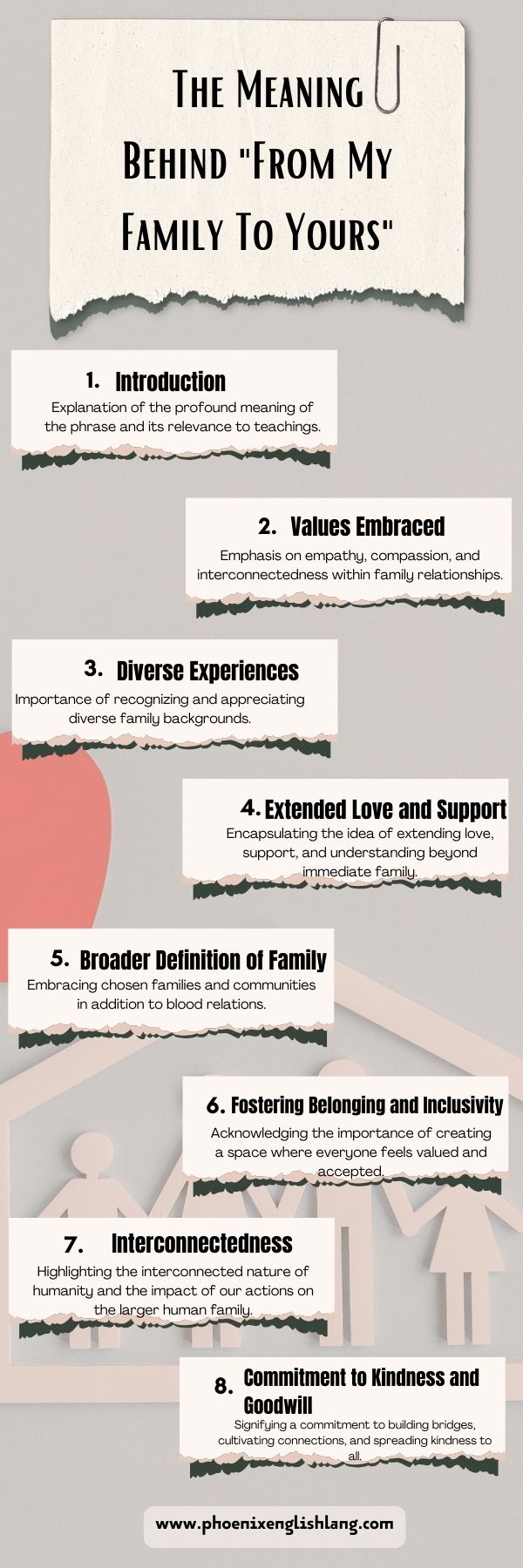In my classes, I emphasize the importance of open and honest communication as a foundation for building trust and understanding among family members. This principle is not just a theoretical concept but a practical approach that can transform the dynamics within a family. Open communication involves sharing thoughts, feelings, and experiences without fear of judgment or reprisal. It creates a safe space where every family member feels heard and valued, which is essential for building strong, healthy relationships.
Engaging in active listening and articulating thoughts and emotions respectfully enables families to effectively manage conflicts, address challenges, and enhance their relationships. Active listening involves dedicating complete attention to the speaker, recognizing their message, and providing thoughtful responses. This approach minimizes the risk of misunderstandings and guarantees that everyone’s perspective is valued. When family members perceive that their viewpoints are significant, they are more inclined to participate in constructive discussions and collaborate in resolving issues.
Effective communication also promotes empathy, allowing family members to better understand each other’s perspectives and needs. Empathy involves putting oneself in another person’s shoes and experiencing their emotions and viewpoints. This emotional connection fosters a deeper understanding and appreciation of each other’s experiences and challenges. When family members practice empathy, they are more likely to support each other and work collaboratively to overcome obstacles.
My instructional approach is designed to empower individuals with essential skills for effective communication within their family structures, thereby promoting healthier and more satisfying relationships. These skills encompass active listening, empathy, assertiveness, and conflict resolution. By honing these abilities, individuals can cultivate a positive and nurturing family atmosphere in which all members feel appreciated and respected.
In addition to these core communication skills, I also emphasize the importance of non-verbal communication. Body language, facial expressions, and tone of voice all play a crucial role in how messages are conveyed and received. Being aware of these non-verbal cues can help family members better understand each other and avoid miscommunication. For example, maintaining eye contact and using an open posture can signal attentiveness and openness, while crossed arms or averted eyes might indicate defensiveness or disinterest.
A crucial element of effective communication is the capacity to handle emotions. Interactions within families can often be fraught with intense feelings, including anger, frustration, or sadness. It is vital to learn how to identify and manage these emotions to ensure that discussions remain constructive and respectful. Strategies such as deep breathing, pausing for reflection, or employing “I” statements can assist individuals in articulating their feelings without heightening conflicts.
Moreover, I encourage families to establish regular communication routines, such as family meetings or check-ins. These scheduled times provide an opportunity for everyone to share updates, discuss concerns, and celebrate achievements. Regular communication helps to keep everyone on the same page and reinforces the habit of open dialogue.
In conclusion, the foundation of a strong and healthy family lies in effective communication. By actively listening, expressing thoughts and feelings respectfully, practicing empathy, and managing emotions, families can build trust and understanding. Through my teachings, I strive to provide individuals with the tools they need to foster positive and fulfilling relationships within their family units. Ultimately, these skills not only enhance family dynamics but also contribute to the overall well-being and happiness of each family member.
What is the main meaning of (From My Family To Yours):

The phrase “From My Family To Yours” holds a profound meaning that resonates deeply with the values I teach in my classes.
It encapsulates the essence of empathy, compassion, and interconnectedness within the context of family relationships.
In my teachings, I emphasize the significance of recognizing and appreciating the diverse experiences and backgrounds that shape each family unit.
“From My Family To Yours” embodies the idea of extending love, support, and understanding beyond one’s immediate family circle.
It encourages individuals to embrace a broader definition of family, one that encompasses not only blood relations but also chosen families and communities.
By using this phrase, we acknowledge the importance of fostering a sense of belonging and inclusivity, creating a space where everyone feels valued and accepted.
It serves as a reminder that we are all interconnected, and our actions and words have the power to impact not only our own families but also the larger human family.
“From My Family To Yours” signifies a commitment to building bridges, cultivating meaningful connections, and spreading kindness and goodwill to all.
You might also enjoy: Inactivation Vs Deactivation: Top 10 Differences I Teach [2024]
1.Strengthening Bonds Through Quality Time

Strengthening family bonds through quality time is a fundamental aspect of nurturing healthy relationships.
I recognize the significance of this topic and its impact on fostering strong connections within families.
In my classes, I emphasize the importance of carving out dedicated time to engage in meaningful activities together.
By prioritizing quality time, families can create lasting memories, deepen their understanding of one another, and build a sense of unity.
Engaging in shared experiences, such as family outings, game nights, or simply having meals together, allows family members to connect on a deeper level and strengthen their emotional bonds.
I teach that quality time is not solely about the quantity of hours spent together, but rather the quality of the interactions and the genuine presence each family member brings.
By being fully present and actively engaged in each other’s lives, families can foster open communication, trust, and a sense of belonging.
Quality time also provides an opportunity for family members to support and encourage one another, fostering a supportive and nurturing environment.
Through my teachings, I aim to inspire individuals to prioritize quality time with their families, recognizing its profound impact on building and maintaining strong, loving relationships.
By prioritizing quality time together, families can foster deeper connections and create lasting memories.
2.Nurturing Emotional Well-being

Emphasizing the importance of emotional well-being within the family unit.
One important lesson that I teach in my classes is the significance of open communication within the family.
Encouraging family members to express their thoughts, feelings, and concerns in a safe and non-judgmental environment can greatly contribute to emotional well-being.
By actively listening and validating each other’s emotions, family members can build trust and strengthen their bond.
Another key aspect I emphasize is the importance of empathy and understanding.
Teaching family members to put themselves in each other’s shoes and consider different perspectives can promote compassion and reduce conflicts.
Encouraging acts of kindness and appreciation within the family can also foster a positive emotional climate.
Furthermore, I highlight the significance of setting healthy boundaries and practicing self-care.
Teaching family members to prioritize their own well-being and respect each other’s personal space can contribute to a harmonious family dynamic.
Promoting activities that promote relaxation, such as mindfulness exercises or engaging in hobbies together, can also enhance emotional well-being.
Lastly, I emphasize the power of forgiveness and conflict resolution within the family.
Teaching effective communication skills, such as active listening and assertive expression of needs, can help family members navigate disagreements and resolve conflicts in a constructive manner.
Encouraging forgiveness and letting go of grudges can contribute to a more peaceful and emotionally healthy family environment.
In summary, nurturing emotional well-being within the family involves fostering open communication, empathy, setting healthy boundaries, practicing self-care, and promoting forgiveness and conflict resolution.
By implementing these principles, families can create a supportive and emotionally fulfilling environment for all members.
By supporting each other’s emotional needs, families can create a safe and supportive environment for everyone to thrive.
You might also enjoy: Themself Or Themselves: Differences + Examples + Usage [2024]
3.Encouraging Open and Honest Communication

The significance of open and honest communication in maintaining healthy family dynamics.
Encouraging open and honest communication within the family is crucial for fostering healthy relationships and resolving conflicts effectively.
By creating a safe and non-judgmental environment, family members can freely express their thoughts, feelings, and concerns.
One effective technique to promote open communication is active listening.
This involves giving full attention to the speaker, maintaining eye contact, and providing verbal and non-verbal cues to show understanding and empathy.
Another important aspect is using “I” statements instead of “you” statements when expressing emotions or concerns.
For example, saying “I feel hurt when this happens” instead of “You always do this” helps to avoid blame and encourages a more constructive conversation.
It is also beneficial to establish regular family meetings or check-ins to discuss important matters and address any issues that may arise.
This dedicated time allows everyone to have a voice and actively participate in decision-making processes.
Encouraging open and honest communication also involves being mindful of non-verbal cues and body language.
Paying attention to facial expressions, tone of voice, and gestures can provide valuable insights into the emotions and intentions behind the words spoken.
Furthermore, it is essential to practice patience and understanding when engaging in family discussions.
Allowing each family member to express their opinions without interruption or judgment fosters a sense of respect and encourages open dialogue.
Creating a culture of appreciation and validation within the family is another effective strategy.
Acknowledging and affirming each other’s perspectives and contributions helps to build trust and strengthens the bond between family members.
Lastly, it is important to be open to feedback and willing to apologize when necessary.
Recognizing and taking responsibility for mistakes or misunderstandings demonstrates humility and encourages others to do the same.
By implementing these strategies, families can cultivate an environment of open and honest communication, leading to stronger relationships, effective problem-solving, and a deeper understanding of one another.
By fostering an environment where everyone feels comfortable expressing themselves, families can resolve conflicts and strengthen their bonds.
4.Promoting Respect and Empathy

The value of respect and empathy in fostering harmonious relationships within the family.
Promoting respect and empathy within the family is crucial for fostering healthy relationships and a harmonious environment.
In my classes, I emphasize the importance of treating family members with kindness and understanding.
One key lesson I teach is the significance of active listening. By actively listening to one another, family members can demonstrate respect and empathy by showing genuine interest in each other’s thoughts and feelings.
This practice helps to create a safe space for open communication and encourages family members to understand and validate each other’s perspectives.
Another important aspect I emphasize is the use of positive language and constructive feedback.
Encouraging family members to express their thoughts and emotions in a respectful manner helps to prevent conflicts and promotes empathy.
By using “I” statements and focusing on specific behaviors rather than attacking the person, family members can address issues without causing unnecessary harm or defensiveness.
Additionally, I stress the importance of recognizing and appreciating each other’s differences.
Teaching family members to embrace diversity within the family unit fosters respect and empathy.
By celebrating individual strengths and unique qualities, family members can develop a deeper understanding and appreciation for one another.
Furthermore, I encourage the practice of forgiveness and conflict resolution.
Teaching family members to forgive and let go of past grievances promotes empathy and understanding.
By providing strategies for resolving conflicts in a peaceful and respectful manner, family members can learn to navigate disagreements without damaging relationships.
Overall, promoting respect and empathy within the family is a continuous process that requires active participation from all members.
By incorporating these teachings into daily interactions, families can cultivate an environment of mutual respect, understanding, and empathy, leading to stronger and more fulfilling relationships.
By practicing respect and empathy towards one another, families can create a positive and inclusive atmosphere where everyone feels valued.
You might also enjoy: Top of The Morning – Meaning + Its origin + Examples [2024]
5.Instilling Values and Morals

The role of parents in instilling values and morals in their children.
Instilling values and morals is an essential aspect of character development within individuals and families.
In my classes, I emphasize the importance of teaching and practicing values that guide ethical decision-making and promote positive behavior.
One key lesson I teach is the value of honesty and integrity. By emphasizing the importance of telling the truth and acting with integrity, individuals can develop a strong moral compass.
I encourage my students to understand that honesty builds trust and fosters healthy relationships, both within the family and in society.
Another important aspect I emphasize is the value of empathy and compassion.
Teaching individuals to consider the feelings and perspectives of others helps to cultivate a sense of empathy and compassion.
By encouraging acts of kindness and teaching the importance of helping those in need, individuals can develop a strong moral foundation based on empathy and compassion.
Additionally, I stress the significance of responsibility and accountability.
Teaching individuals to take responsibility for their actions and the consequences that follow helps instill a sense of personal accountability.
By encouraging individuals to reflect on their choices and learn from their mistakes, they can develop a strong sense of moral responsibility.
Furthermore, I emphasize the value of respect for oneself and others.
Teaching individuals to treat themselves and others with respect helps to foster positive relationships and a healthy self-image.
By promoting inclusivity and teaching the importance of embracing diversity, individuals can develop a strong moral framework based on respect for all.
Moreover, I encourage the practice of gratitude and appreciation.
Teaching individuals to express gratitude for the blessings in their lives helps cultivate a sense of humility and appreciation.
By fostering a mindset of gratitude, individuals can develop a moral compass that values the importance of acknowledging and valuing the contributions of others.
Overall, instilling values and morals is a lifelong journey that requires consistent teaching and modeling.
By incorporating these teachings into daily life and providing opportunities for individuals to practice these values, families can create a strong foundation for ethical decision-making and positive behavior.
By teaching and modeling positive values, families can shape the character and behavior of their members, contributing to a better society.
6.Supporting Each Other’s Goals and Dreams

The importance of supporting and encouraging individual aspirations within the family.
Supporting each other’s goals and dreams is a fundamental aspect of building a strong and nurturing family dynamic.
In my classes, I emphasize the importance of encouraging and uplifting one another in pursuit of individual aspirations.
One key lesson I teach is the significance of active encouragement.
By actively supporting and cheering on family members in their endeavors, we demonstrate our belief in their abilities and show that we are invested in their success.
This practice helps to create a positive and motivating environment where everyone feels empowered to pursue their goals.
Another important aspect I emphasize is the power of collaboration.
Encouraging family members to work together towards their individual goals fosters a sense of unity and shared purpose.
By offering assistance, sharing resources, and providing constructive feedback, family members can contribute to each other’s growth and development.
Additionally, I stress the importance of setting realistic expectations and celebrating milestones along the way.
Teaching family members to break down their goals into manageable steps helps to maintain motivation and prevent overwhelm.
By acknowledging and celebrating each other’s achievements, we create a supportive atmosphere that fuels further progress.
Furthermore, I encourage the practice of active listening and open communication.
By genuinely listening to each other’s aspirations and dreams, family members can offer valuable insights, suggestions, and emotional support.
This fosters a sense of trust and understanding, allowing family members to feel safe in sharing their goals and seeking guidance when needed.
Moreover, I emphasize the importance of resilience and perseverance.
Teaching family members to overcome obstacles and setbacks on their journey towards their goals instills a sense of determination and resilience.
By providing strategies for problem-solving and offering emotional support during challenging times, family members can navigate difficulties with confidence and resilience.
Overall, supporting each other’s goals and dreams within the family is a continuous process that requires active engagement and genuine care.
By incorporating these teachings into our interactions, families can create an environment where everyone feels valued, supported, and motivated to pursue their passions and aspirations.
By providing support and encouragement, families can help each member achieve their goals and dreams, fostering a sense of fulfillment and happiness.
You might also enjoy: Where Does ;How is your Day Going? ; Originate From?
7. Embracing Diversity and Inclusion

The significance of embracing diversity and promoting inclusivity within the family unit.
Embracing diversity and inclusion within the family is essential for creating a supportive and accepting environment.
In my classes, I emphasize the value of celebrating and respecting the unique qualities and backgrounds that each family member brings.
One key lesson I teach is the importance of open-mindedness.
Encouraging family members to approach differences with curiosity and a willingness to learn fosters a culture of acceptance and understanding.
By embracing diverse perspectives, experiences, and cultures, family members can broaden their horizons and develop a deeper appreciation for one another.
Another aspect I emphasize is the power of empathy.
Teaching family members to put themselves in each other’s shoes helps to cultivate understanding and compassion.
By encouraging family members to consider the challenges and experiences of others, we can foster a sense of empathy and create a safe space for everyone to be heard and understood.
Additionally, I stress the significance of inclusive language and behavior.
By using inclusive language that acknowledges and respects different identities and backgrounds, family members can create an environment where everyone feels valued and included.
Encouraging family members to actively seek out diverse perspectives and engage in meaningful conversations promotes a sense of belonging and unity.
Furthermore, I encourage the exploration of different cultures and traditions within the family.
By learning about and participating in each other’s customs and celebrations, family members can deepen their understanding and appreciation for diversity.
This can be done through activities such as cooking traditional meals together, attending cultural events, or sharing stories and experiences.
Overall, embracing diversity and inclusion within the family is a continuous journey that requires ongoing effort and education.
By incorporating these teachings into daily interactions, families can create a space where everyone feels respected, valued, and celebrated for who they are.
This not only strengthens family bonds but also sets a positive example for embracing diversity and inclusion in the wider community.
By celebrating differences and creating an inclusive environment, families can cultivate acceptance, understanding, and harmony among its members.
You might also enjoy: In The Office or At The Office: 7 Key Differences [2024]
Conclusion
In conclusion, the power of family cannot be underestimated. It is within the family unit that we learn the values of respect, empathy, and love. These core values are essential for building strong and meaningful relationships that can withstand the test of time. By promoting these qualities within our families, we create a foundation for a supportive and nurturing environment where every member feels valued and understood.
The strength of family resides in its capacity to offer support, empathy, and a profound sense of belonging. During moments of happiness and hardship, it is our family that remains steadfast, providing a comforting presence and assistance. This consistent support is vital for our emotional health and aids us in navigating life’s fluctuations.
The feeling of belonging that accompanies being part of a family instills in us the assurance to confront challenges and chase our aspirations, secure in the knowledge that a robust support network is behind us.
Through familial connections, we discover solace, motivation, and the resilience needed to tackle difficulties. These connections are cultivated through shared moments, both joyful and challenging, and are reinforced by the affection and consideration we extend to one another.
In times of adversity, it is our family that offers the encouragement and inspiration necessary to persevere. Their faith in our abilities can serve as a formidable influence, empowering us to surmount barriers and realize our ambitions.
By fostering and valuing our familial relationships, we can witness the profound influence of love. Love serves as the foundation that unites families, and it is through acts of kindness, empathy, and comprehension that we can reinforce these connections.
Even modest actions, such as dedicating time to one another, actively listening, and expressing gratitude, can significantly enhance our relationships. By committing to nurture these ties, we can cultivate a supportive and affectionate family atmosphere that is advantageous for all members.
The influence of a robust family structure reaches far beyond its individual members, generating a ripple effect throughout the broader community. Strong and supportive families play a vital role in enhancing the overall welfare of society. Children raised in nurturing and loving environments are more inclined to mature into self-assured and empathetic adults, capable of making a positive difference in their surroundings.
By nurturing strong familial connections, we not only enhance our own lives but also contribute to the creation of a more compassionate and improved society.
In addition, the teachings we receive from our families can accompany us for the entirety of our lives. The principles of respect, empathy, and love instilled in us at home can influence our interactions with others and assist us in forming significant relationships beyond our familial ties.
Furthermore, these values can motivate us to cultivate greater understanding and compassion for others, thereby fostering a more harmonious and interconnected society.

Hi, welcome to my blog! My name is Omid and I am thrilled to have you here! I am an English language teacher with 12 years of experience and hold multiple international certifications (TESOL, IELTS, TOEFL, PTE, CELTA). Additionally, I hold a PhD in Applied Linguistics with a specialization in Teaching English as a Second Language (TESL), which fuels my passion for teaching English and assisting others in mastering the language. To me, nothing is more rewarding than helping individuals enhance their English language abilities through various methods. So, let’s embark on this journey of learning English together.




